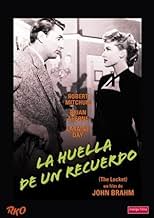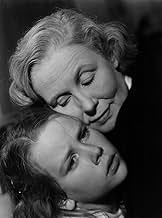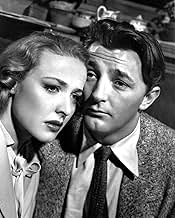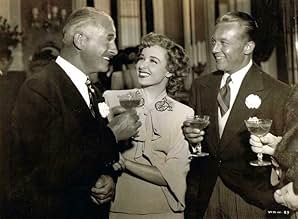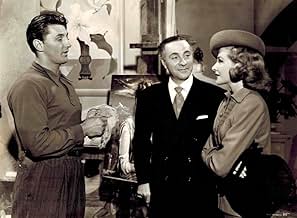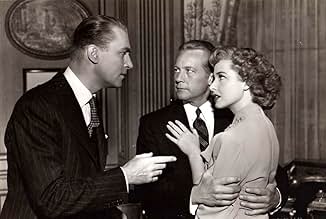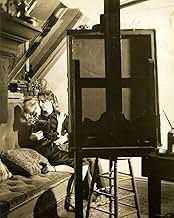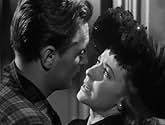IMDb RATING
7.1/10
3.4K
YOUR RATING
Just before his wedding, the bridegroom hears a complex tale painting his lovely bride as devilish and unbalanced.Just before his wedding, the bridegroom hears a complex tale painting his lovely bride as devilish and unbalanced.Just before his wedding, the bridegroom hears a complex tale painting his lovely bride as devilish and unbalanced.
- Awards
- 4 wins total
- Director
- Writers
- All cast & crew
- Production, box office & more at IMDbPro
Featured reviews
This film by underrated director John Brahm is one of the more interesting works of the 1940s (not one of the best, but different).
Laraine Day plays Nancy, about to marry and hiding some dark secrets in her past. She was excellent at this kind of thing. Gene Raymond (not the most charismatic of actors but surprisingly good here) plays her intended, with Brian Aherne as the psychiatrist who knows about her previous life.
In flashback we see Nancy and her husband (a young Robert Mitchum) and then into another flashback (daring to attempt this at the time when many films were still pursuing conventional structure).
'The Locket' of the title obviously holds the key to the mystery, and we have an absorbing time pulling all the loose ends together. Reginald Denny, Ricardo Cortez, and Ellen Corby decorate an accomplished cast.
Laraine Day plays Nancy, about to marry and hiding some dark secrets in her past. She was excellent at this kind of thing. Gene Raymond (not the most charismatic of actors but surprisingly good here) plays her intended, with Brian Aherne as the psychiatrist who knows about her previous life.
In flashback we see Nancy and her husband (a young Robert Mitchum) and then into another flashback (daring to attempt this at the time when many films were still pursuing conventional structure).
'The Locket' of the title obviously holds the key to the mystery, and we have an absorbing time pulling all the loose ends together. Reginald Denny, Ricardo Cortez, and Ellen Corby decorate an accomplished cast.
The Locket (1946)
Well, when you have a post-war movie with Robert Mitchum at his young prime, you can't go wrong.
The star (or starlet, as they used to say) is actress Laraine Day playing Nancy, and she pulls off a charming, attentive, smart perfect woman. A bride to be, in fact. The movie starts with people arrive to a high class wedding. Mitchum shows up via flashback (classic film noir stuff). In fact, there is a flashback within a flashback within a flashback (4 levels) and it's sort of fun.
There are some great lines like, "If you'e lucky you can afford to be nice." But some of the dialog, and maybe the plot overall, is a hair stiff at times.
Director John Brahm is not well known, but his "Hangover Square" the year before is really great. And this one shows a consistent sense of storytelling and drama with highs and lows if not always fully developed characters. The key character is Nancy, who uses her charm to win over the audience as well as the men around her in the plot. Day plays her role perfectly—swiveling sweetness against a just perceptible insincerity. She's a terrific liar.
Which brings me back to Mitchum, who is good but seems to be reading rehearsed lines too often. I think there was supposed to be chemistry between Day and Mitchum, but it wasn't there, even though they both look terribly good.
Though it has a noir-like flavor, this strikes me as a straight up melodrama overall, and with soaring music and lots of dramatic lighting there is no way to not get absorbed in it. There are some short but well done scenes of London during the war (bombs and blackouts).
A well done and lesser known good one. And a fun curiosity—the crazed music box music that denotes an uneven state of mind is the same as that used in the "Bad Seed."
Well, when you have a post-war movie with Robert Mitchum at his young prime, you can't go wrong.
The star (or starlet, as they used to say) is actress Laraine Day playing Nancy, and she pulls off a charming, attentive, smart perfect woman. A bride to be, in fact. The movie starts with people arrive to a high class wedding. Mitchum shows up via flashback (classic film noir stuff). In fact, there is a flashback within a flashback within a flashback (4 levels) and it's sort of fun.
There are some great lines like, "If you'e lucky you can afford to be nice." But some of the dialog, and maybe the plot overall, is a hair stiff at times.
Director John Brahm is not well known, but his "Hangover Square" the year before is really great. And this one shows a consistent sense of storytelling and drama with highs and lows if not always fully developed characters. The key character is Nancy, who uses her charm to win over the audience as well as the men around her in the plot. Day plays her role perfectly—swiveling sweetness against a just perceptible insincerity. She's a terrific liar.
Which brings me back to Mitchum, who is good but seems to be reading rehearsed lines too often. I think there was supposed to be chemistry between Day and Mitchum, but it wasn't there, even though they both look terribly good.
Though it has a noir-like flavor, this strikes me as a straight up melodrama overall, and with soaring music and lots of dramatic lighting there is no way to not get absorbed in it. There are some short but well done scenes of London during the war (bombs and blackouts).
A well done and lesser known good one. And a fun curiosity—the crazed music box music that denotes an uneven state of mind is the same as that used in the "Bad Seed."
I give full credit to this little treat for introducing me to the world of noir cinema when I happened to stumble onto it on AMC. (Oh, that AMC showed films of this caliber lately!) Laraine Day gives a beautifully understated performance, handling what would now perhaps be called a tragic case of posttraumatic stress disorder resulting in a life of twists and turns with truth, no scenery chewing. Brian Aherne strikes just the right clinical note as the sadder-but-wiser exhusband, and Robert Mitchum gives a memorable performance as the first (at least the first chronicled in this tale) man to fall victim to Nancy's fatal charms. As Norman, he certainly delivers a farewell present to Nancy's physician spouse, and by extension, to Nancy, that they won't soon forget. The denouement at the mansion while wedding guests await fair Nancy is gripping cinema. Watch for a great performance by the mother of Joan Fontaine and Olivia Dehaviland as the cruel woman responsible for Nancy's childhood trauma. Worth the while!
Yes! This is the movie that does just that - but it's worth watching for more than that. It is an inspired piece of film-making with excellent direction and fine photography. It also features some strong performances especially from the (is she or isn't she evil) Laraine Day, and the wonderful Brian Aherne. And Robert Mitchum's pretty good too. The best bits are almost expressionist - especially the music box shots - and it's full of the pseudo psychological nonsense that Hollywood loved so much in this era. Highly enjoyable.
Just before his wedding to the beautiful and carefree Nancy, John Willis is visited by Doctor Harry Blair who informs him that he knows the real Nancy and warns the doctor not to make the same mistake as him by marrying her. He tells her the story of how he had just married Nancy when a man called Clyde turned up in his office and told him a story about how he had met Nancy and had got drawn into her world of deception.
Shunning conventional structure is always a risk and in this film it is one that it takes as we have a story being told by Blair that is basically about him being told a story by Clyde. This makes for an interesting approach especially since the stories are both told by her dumped lovers. In this regard we're not sure what is true and what isn't and, while the stories engage on one level, I was conscious of the fact that they were telling and not necessarily facts (a trick Usual Suspects would later repeat to great praise). Existing within the minds of the characters, the story is interesting and is all the better at the end for it. For many viewers the story-telling approach will be a little slow and I times it did drag a bit but mostly it comes together and works as something different and interesting.
The cast are roundly good although they take second fiddle to the script and the ideas of director Brahm (who produces some clever ideas in Nancy's bridal march). Aherne is a bit too stiff in the role where really I wanted him to display a bit more range. Mitchum is good in his role but it wasn't the sort of thing I was used to seeing him in and he has been much better elsewhere. Day takes the main role of Nancy and does well with it she is part of the reason we're not sure what is true and what isn't and she convinced me that she didn't know either. She has plenty of nice touches as well as one or two very strong moments. Like I said though, this wasn't a great actors film but nobody was less than good.
Overall this is an interesting and different film that takes a risk by stepping back to flashback within flashback but mostly pulls it off. The story format might be a little testing on the patience (hearing about something implies a lack of action in the time where we are after all the audience spent the film in the Willis study) but the material is worth it and, once back in the present, everything comes together nicely. Worth seeing for being a different style of drama from the period.
Shunning conventional structure is always a risk and in this film it is one that it takes as we have a story being told by Blair that is basically about him being told a story by Clyde. This makes for an interesting approach especially since the stories are both told by her dumped lovers. In this regard we're not sure what is true and what isn't and, while the stories engage on one level, I was conscious of the fact that they were telling and not necessarily facts (a trick Usual Suspects would later repeat to great praise). Existing within the minds of the characters, the story is interesting and is all the better at the end for it. For many viewers the story-telling approach will be a little slow and I times it did drag a bit but mostly it comes together and works as something different and interesting.
The cast are roundly good although they take second fiddle to the script and the ideas of director Brahm (who produces some clever ideas in Nancy's bridal march). Aherne is a bit too stiff in the role where really I wanted him to display a bit more range. Mitchum is good in his role but it wasn't the sort of thing I was used to seeing him in and he has been much better elsewhere. Day takes the main role of Nancy and does well with it she is part of the reason we're not sure what is true and what isn't and she convinced me that she didn't know either. She has plenty of nice touches as well as one or two very strong moments. Like I said though, this wasn't a great actors film but nobody was less than good.
Overall this is an interesting and different film that takes a risk by stepping back to flashback within flashback but mostly pulls it off. The story format might be a little testing on the patience (hearing about something implies a lack of action in the time where we are after all the audience spent the film in the Willis study) but the material is worth it and, once back in the present, everything comes together nicely. Worth seeing for being a different style of drama from the period.
Did you know
- TriviaNorma Barzman's lengthy treatment for this film, which Sheridan Gibney revised into a screenplay, was inspired by a true event which was recounted to her by financier George Peabody Gardner and his sister Belle. When younger, the Gardners eschewed their aristocratic upbringing partly in reaction to an incident in their youth: As children they became friendly with the daughter of the family's housekeeper. It transpired that the daughter was wrongly accused of stealing a locket, leading to the firing and departure of the housekeeper and her daughter. Years later, they learned that the daughter suffered from depression and was implicated in a theft, a consequence for which the Gardners felt their family was partly responsible.
- GoofsAmerican ambulances, shown driven with left-hand drive, were not used in wartime London.
- Quotes
Norman Clyde: I don't take money for nothing. I'm not conducting a class so the parasitic rich can escape boredom. I'm not that hard up.
Nancy Patton: Well, I hope you never will be, Mr. Clyde. I admire your principles. I wish I could say the same for your disposition.
- ConnectionsEdited into Histoire(s) du cinéma: Fatale beauté (1994)
Details
- Runtime
- 1h 25m(85 min)
- Color
- Aspect ratio
- 1.33 : 1
Contribute to this page
Suggest an edit or add missing content

